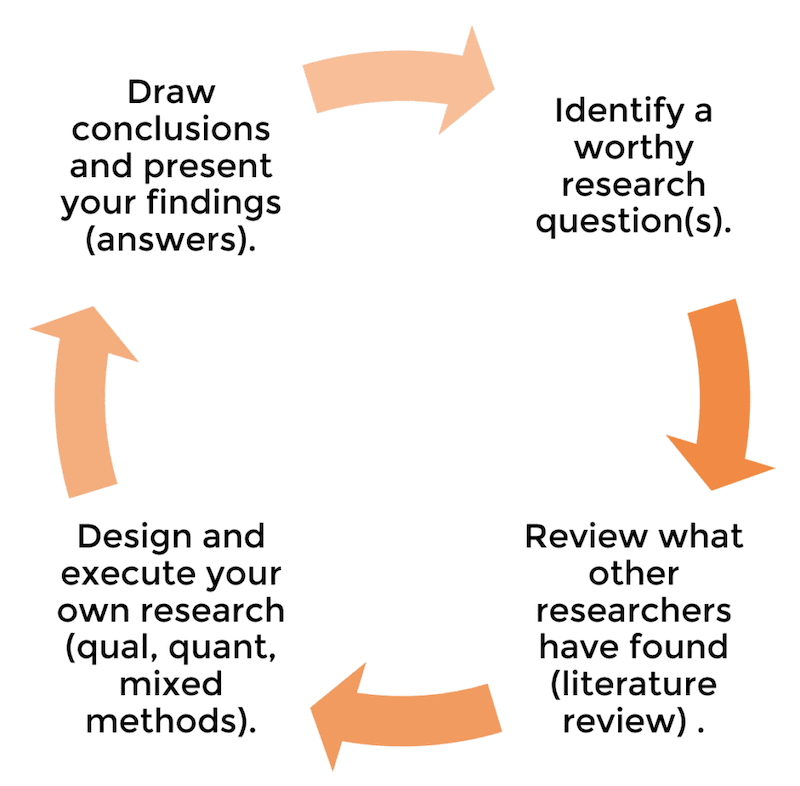What (Exactly) Is A Dissertation?
A Plain-Language Explainer With Examples + Free Template 📝
By: Derek Jansen (MBA) | Expert Reviewer: Dr. Eunice Rautenbach (DTech) | Updated March 2025

If you’ve landed on this article, chances are you’ve got a dissertation or thesis project coming up (hopefully it’s not due next week!), and you’re now asking yourself the age old question, “What the #%#%^ is a dissertation even?”.
In this post, we’ll break down the basics of exactly what a dissertation is, in plain language. No ivory tower academia. You can also grab a copy of our free dissertation template below.
So, let’s get to the pressing question – what is a dissertation?
A dissertation (or thesis) = a research project
Simply put, a dissertation (or thesis – depending on which country you’re studying in) is a research project. In other words, your task is to ask a research question (or set of questions) and then set about finding the answer(s). Simple enough, right?
Well, the catch is that you’ve got to undertake this research project in an academic fashion, and there’s a wealth of academic language that makes it all (look) rather confusing (thanks, academia). However, at its core, a dissertation is about undertaking research (investigating something). This is really important to understand, because the key skill that your university is trying to develop in you (and will be testing you on) is your ability to undertake research in a well-structured structured, critical and academically rigorous way.
This research-centric focus is significantly different from assignments or essays, where the main concern is whether you can understand and apply the prescribed module theory. I’ll explain some other key differences between dissertations or theses and assignments a bit later in this article, but for now, let’s dig a little deeper into what a dissertation is.
A dissertation (or thesis) is a process.
Okay, so now that you understand that a dissertation is a research project (which is testing your ability to undertake quality research), let’s go a little deeper into what that means in practical terms.
The best way to understand a dissertation is to view it as a process – more specifically a research process (it is a research project, after all). This process involves four essential steps, which I’ll discuss below.

Step 1 – You identify a worthy research question
The very first step of the research process is to find a meaningful research question, or a set of questions. In other words, you need to find a suitable topic for investigation. Since a dissertation is all about research, identifying the key question(s) is the critical first step. Here’s an example of a well-defined research question:
“Which factors cultivate or erode customer trust in UK-based life insurance brokers?”
This clearly defined question sets the direction of the research. From the question alone, you can understand exactly what the outcome of the research might look like – i.e. a set of findings about which factors help brokers develop customer trust, and which factors negatively impact trust.
But how on earth do I find a suitable research question, you ask? Don’t worry about this right now – when you’re ready, you can read our article about finding a dissertation topic. However, right now, the important thing to understand is that the first step in the dissertation process is identifying the key research question(s). Without a clear question, you cannot move forward.
Step 2 – You review the existing research
Once the research question is clearly established, the next step is to review the existing research/literature (both academic and professional/industry) to understand what has already been said with regard to the question. In academic speak, this is called a literature review.
This step is critically important as, in all likelihood, someone else has asked a similar question to yours, and therefore you can build on the work of others. Good academic research is not about reinventing the wheel or starting from scratch – it’s about familiarising yourself with the current state of knowledge, and then using that as your basis for further research.
Simply put, the first step to answering your research question is to look at what other researchers have to say about it. Sometimes this will lead you to change your research question or direction slightly (for example, if the existing research already provides a comprehensive answer). Don’t stress – this is completely acceptable and a normal part of the research process.
Step 3 – You carry out your own research
Once you’ve got a decent understanding of the existing state of knowledge, you will carry out your own research by collecting and analysing the relevant data. This could take to form of primary research (collecting your own fresh data), secondary research (synthesising existing data) or both, depending on the nature of your degree, research question(s) and even your university’s specific requirements.
Exactly what data you collect and how you go about analysing it depends largely on the research question(s) you are asking, but very often you will take either a qualitative approach (e.g. interviews or focus groups) or a quantitative approach (e.g. online surveys). In other words, your research approach can be words-based, numbers-based, or both. Don’t let the terminology scare you and don’t worry about these technical details for now – we’ll explain research methodology in later posts.
Step 4 – You develop answers to your research question(s)
Combining your understanding of the existing research (Step 2) with the findings from your own original research (Step 3), you then (attempt to) answer your original research question(s). The process of asking, investigating and then answering has gone full circle.

Of course, your research won’t always provide rock-solid answers to your original questions, and indeed you might find that your findings spur new questions altogether. Don’t worry – this is completely acceptable and is a natural part of the research process.
So, to recap, a dissertation is best understood as a research process, where you are:
- Ask a meaningful research question(s)
- Carry out the research (both existing research and your own)
- Analyse the results to develop an answer to your original research question(s).
I didn’t know if I was good enough.
See how Kelsee went from lost and confused to conquering her PhD.Depending on your specific degree and the way your university designs its coursework, you might be asking yourself “but isn’t this just a longer version of a normal assignment?”. Well, it’s quite possible that your previous assignments required a similar research process, but there are some key differences you need to be aware of, which I’ll explain next.
Same same, but different…
While there are, naturally, similarities between dissertations/theses and assignments, its important to understand the differences so that you approach your dissertation with the right mindset and focus your energy on the right things. Here, I’ll discuss four ways in which writing a dissertation differs substantially from assignments and essays, and why this matters.
Difference #1 – You must decide (and live with) the direction.
Unlike assignments or essays, where the general topic is determined for you, for your dissertation, you will (typically) be the one who decides on your research questions and overall direction. This means that you will need to:
- Find a suitable research question (or set of questions)
- Justify why its worth investigating (in the form of a research proposal)
- Find all the relevant existing research and familiarise yourself with the theory
This is very different from assignments, where the theory is given to you on a platter, and the direction is largely pre-defined. Therefore, before you start the dissertation process, you need to understand the basics of academic research, how to find a suitable research topic and how to source the relevant literature.

Difference #2 – It’s a long project, and you’re on your own.
A dissertation is a long journey, at least compared to assignments. Typically, you will spend 3 – 6 months writing around 15,000 – 25,000 words (for Masters-level, much more for PhD) on just one subject. Therefore, successfully completing your dissertation requires a substantial amount of stamina.
To make it even more challenging, your classmates will not be researching the same thing as you are, so you have limited support, other than your supervisor (who may be very busy). This can make it quite a lonely journey. Therefore, you need a lot of self-discipline and self-direction in order to see it through to the end. You should also try to build a support network of people who can help you through the process (perhaps alumni, faculty or a private coach).
Difference #3 – They’re testing research skills.
We touched on this earlier. Unlike assignments or essays, where the markers are assessing your ability to understand and apply the theories, models and frameworks that they provide you with, your dissertation will be is assessing your ability to undertake high-quality research in an academically rigorous manner.
Of course, your ability to understand the relevant theory (i.e. within your literature review) is still very important, but this is only one piece of the research skills puzzle. You need to demonstrate the full spectrum of research skills.
It’s important to note that your research does not need to be ground-breaking, revolutionary or world-changing – that is not what the markers are assessing. They are assessing whether you can apply well-established research principles and skills to a worthwhile topic of enquiry. Don’t feel like you need to solve the world’s major problems. It’s simply not going to happen (you’re a first-time researcher, after all) – and doesn’t need to happen in order to earn good marks.
Difference #4 – Your focus needs to be narrow and deep.
In your assignments, you were likely encouraged to take a broad, interconnected, high-level view of the theory and connect as many different ideas and concepts as possible. In your dissertation, however, you typically need to narrow your focus and go deep into one particular topic. Think about the research question we looked at earlier:
“Which factors cultivate or erode customer trust in UK-based life insurance brokers?”
The focus is intentionally very narrow – specifically the focus is on:
- The UK only – no other countries are being considered.
- Life insurance brokers only – not financial services, not vehicle insurance, not medical insurance, etc.
- Customer trust only – not reputation, not customer loyalty, not employee trust, supplier trust, etc.
By keeping the focus narrow, you enable yourself to deeply probe whichever topic you choose – and this depth is essential for earning good marks. Importantly, ringfencing your focus doesn’t mean ignoring the connections to other topics – you should still acknowledge all the linkages, but don’t get distracted – stay focused on the research question(s).

So, as you can see, a dissertation is more than just an extended assignment or essay. It’s a unique research project that you (and only you) must lead from start to finish. The good news is that, if done right, completing your dissertation will equip you with strong research skills, which you will most certainly use in the future, regardless of whether you follow an academic or professional path.
Wrapping up
Hopefully in this post, I’ve answered your key question, “what is a dissertation?”, at least at a big picture-level. To recap on the key points:
- A dissertation is simply a structured research project.
- It’s useful to view a dissertation as a process involving asking a question, undertaking research and then answering that question.
- First and foremost, your marker(s) will be assessing your research skills, so its essential that you focus on producing a rigorous, academically sound piece of work (as opposed to changing the world or making a scientific breakthrough).
- While there are similarities, a dissertation is different from assignments and essays in multiple ways. It’s important to understand these differences if you want to produce a quality dissertation.
In this post, I’ve gently touched on some of the intricacies of the dissertation, including research questions, data types and research methodologies. Be sure to check out the Grad Coach Blog for more detailed discussion of these areas.
Don't Stop Now - There's More ✨

Qualitative Research Basics: The 20,000-Foot View
New to qualitative? Learn about the four key phases of the qualitative research process: data collection, coding, analysis, and writing.

How To Choose The Right Qualitative Analysis Method
Not sure which qualitative analysis method to use? Learn how to choose the right method for your specific research project.

Reflexivity & Triangulation In Qualitative Research
Learn how reflexivity and triangulation help manage subjectivity in qualitative research by enhancing credibility and minimising bias.

Trustworthiness In Qualitative Research
Learn about the four pillars of trustworthiness in qualitative research: credibility, transferability, dependability, and confirmability.

How To Choose A Tutor For Your Dissertation
Hiring the right tutor for your dissertation or thesis can make the difference between passing and failing. Here’s what you need to consider.


Hello Derek
Yes, I struggle with literature review and am highly frustrated (with myself).
Thank you for the guide that you have sent, especially the apps. I am working through the guide and busy with the implementation of it.
Hope to hear from you again!
Regards
Micheal
Great to hear that, Michael. All the best with your research!
Very useful and clear information.
Thank you. That was quite something to move forward with. Despite the fact that I was lost. I will now be able to do something with the information given.
That’s great, Pheladi. Good luck!
Dear Derek
Thank you so much for your videos and writing research proposal and dissertation. These videos are useful. I was struggling, but now I am starting to write. I hope to watch your more videos to learn more about the dissertation.
Before this post, I didn’t know where to start my research, today I have some light and do certain % of my research. I may need for direction on literature review. Big thanks to you.
thank u
Very very good Derek
Thanks immensely Derek
You’re welcome 🙂
Good luck with your dissertation/thesis.
Thank you Derek for widening my scope on research, this can be likened to a blind man whose eyes can now see.
Remain bless sir🙏
You guys are doing really great… I am extremely grateful for your help… Keep going.. Please activate that research help for indian students as well I couldn’t access it being an indian.
Hello Derek,
I got stuck in the concept paper because I changed my topic. Now I don’t know where to pick up the pieces again. How can I focus and stay on track. I am getting scared.
Thank you so much Derek, I am a new comer, learning for the first time how to write a good research. These in information’s to me is a mind opener, I hope to learn more from you in the future, Thanks and God bless.
Thanks Guys this means so much to me
A pretty good and insightful piece for beginners like me. Looking forward to more helpful hints and guide.
Thanks to Derek.
This is so helpful…really appreciate your work.
Great to hear that
On cybersecurity Analytics research to banking transactions
This was of great help to me and quite informative .
Thank you so much GradCoach,
This is like a light at the end of the tunnel. You are a lifesaver. Thank you once again.
hello,
I’m so grateful for such great information. It appears basic, but it is so relevant in understanding the research process.
Your website is very helpful for writing thesis. A big well done to the team. Do you have a website for paper writing and academic publishing or how to publish my thesis, how to land a fully funded PhD, etc. Just the general upward trajectory in the academia. Thank you
I have learned a lot from the lectures, it was beneficial and helped me a lot in my research journey. Thank you very much
Thank you for your gifts of enlightenment to a person like me who’s always a student.
May your ‘well’not dry out.
It’s quite a fun and superb, now I have come to believe that the way one teach can have an impact in understanding and can change one’s assumption and position about a subject or a problem, before I came here and learn I consider research methodology a hard thing because, I wasn’t taught by a mentor like this one. Thanks so much who ever have make this effort to make this something easy and engaging
I can’t imagine that world has achieved major aspects of every field of study
Thank you very much for all the valuable, wonderful and comprehensive amount of information… I highly appreciate your support, 100% I recommend you
This topic is intended for my MPhil. Work (The perception of parents on Technical and Vocational Education, the impact on educational policy). May you consider the suitability of the topic for me and refine if the need be. Thank you,
Hello here…
i have gone through the notes and it is interesting. All i need now is a pdf file that contain a whole dissertation writing inclusive of chapter 1 to 5 on motivation as a topic… thanks
Remarkable!!! You made it sound so simple
I got stuck in my writing because I need to change my topic. I am getting scared as I have a semester left 🙁
Thanks for such an educational opportunity and support
Thanks for your educational opportunity and support
Could you please share me with the App. to use for literature review